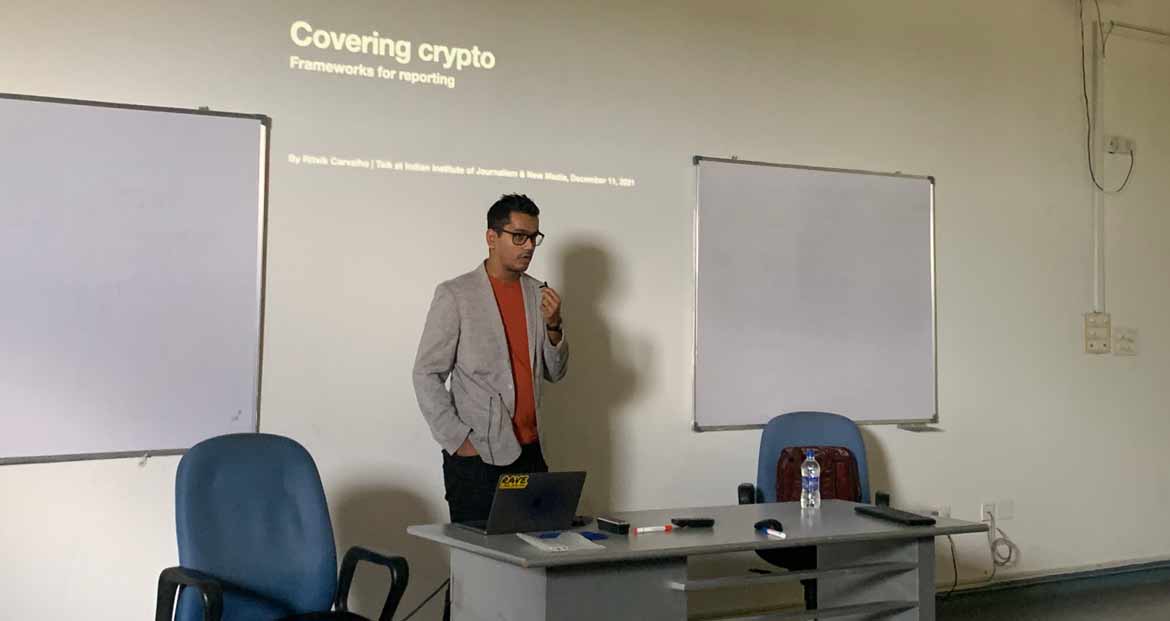
Born on Internet, cryptocurrencies are extremely volatile: Ritvik Carvalho
One has to be extremely careful while investing in them, says analyst and data journalist
“Crypto is fundamentally a technology story,” said analyst and data journalist Ritvik Carvalho.
Addressing IIJNM students on cryptocurrencies on December 11, he began by asking, “What is the most distinctive thing about crypto?” Answers ranged from decentralization of the currency to how unregulated it is. Someone also talked about the volatility of cryptocurrencies.
Carvalho gave the answer in one statement: “Crypto is an Internet-native phenomenon. It started on the Internet, it lives, breathes, grows, and if one day it’s gone, it will die on the Internet too.”
Journalism is based on sources. Be it human sources or physical sources like government documents or data, both are important for any kind of journalism. In the same way, to cover cryptocurrencies, a journalist needs to have sources. Carvalho spoke of four major sources: Telegram groups, Reddit, Discord servers and Twitter. People on these forums discuss all kinds of things. It just so happens that a good chunk of the crypto community converges on these forums to discuss cryptocurrencies.
The basic — and huge — difference between traditional financial markets and cryptocurrency markets is that the latter are extremely volatile, he said. A 10 percent change in the traditional financial markets is a huge thing, whereas the same fluctuation in the crypto market is an “everyday thing” that is nothing to worry about.
About market cycles, he explained a bull market is when stocks and cryptocurrencies rise, whereas a bear market is the opposite of it. “Crypto market cycles are accelerated versions of the traditional market cycle,” he noted.
Explaining two key concepts, he said “cold wallets” are not offline cryptocurrencies. They are a way to store cryptocurrencies/digital assets offline. “Whale activity” is when an individual who owns a sizeable chunk of a particular token is doing something with it: buying/selling/moving it between wallets/on or off exchanges.
Two areas where journalists can look for cryptocurrencies stories are institutional adoption and investor adoption. They should observe how institutions invest for the long term; compare different regulatory markets around the world; look at their policies regarding cryptocurrencies; and find why big companies are suddenly investing in cryptocurrencies.
About the environmental impact of cryptocurrencies, Carvalho said: “Crypto mining is a huge energy consumer.”
He explained how non-fungible tokens (NFTs) are a great way for digital artists to monetize their work. Gaming companies, too, are entering the crypto market.
The students asked the speaker some interesting questions.
Asked how to gauge a cryptocurrency, Carvalho replied one should study the token one is looking to invest in as every token has its own structure. “Like equity markets, where you look for fundamentals and technicals, you have to look for the same in a crypto market,” he said. “Study how the coin has been doing over the years, and its reputation.”
Just like traditional financial markets, he concluded, cryptocurrency markets are not completely rational, so investors have to be extremely careful.
By Swarali Bodas
